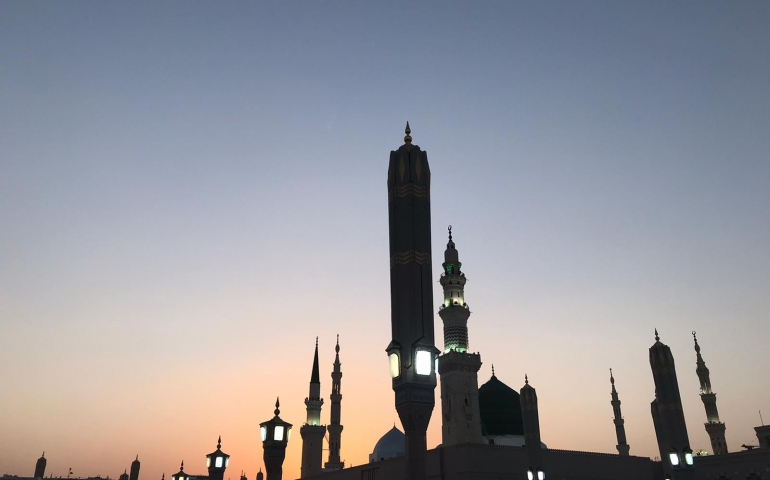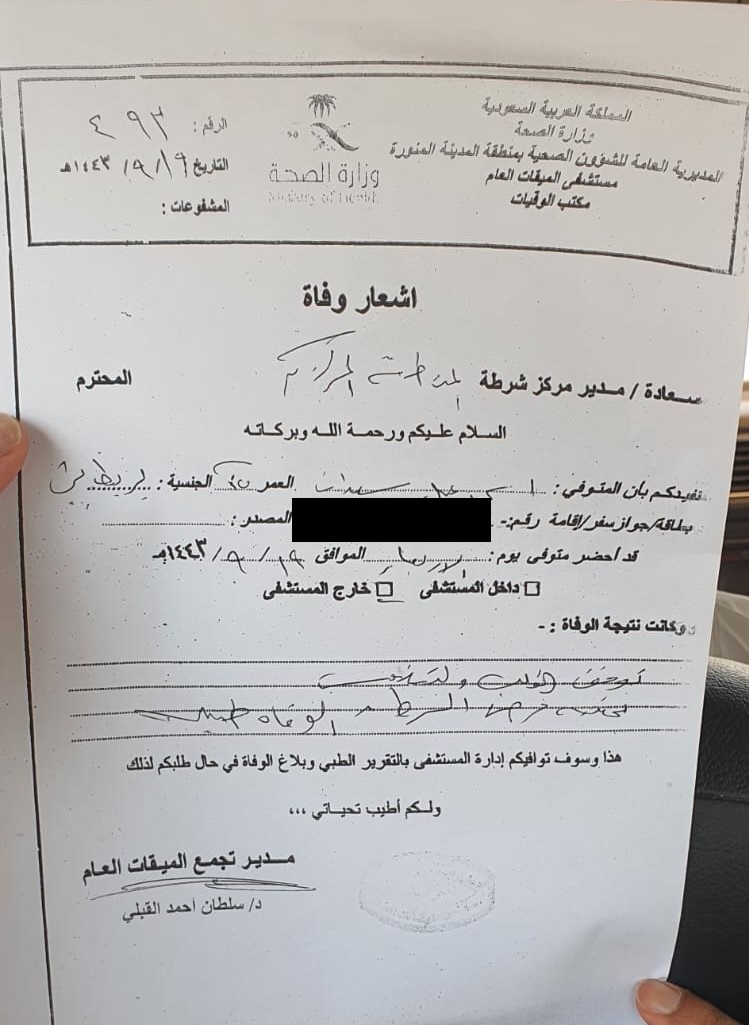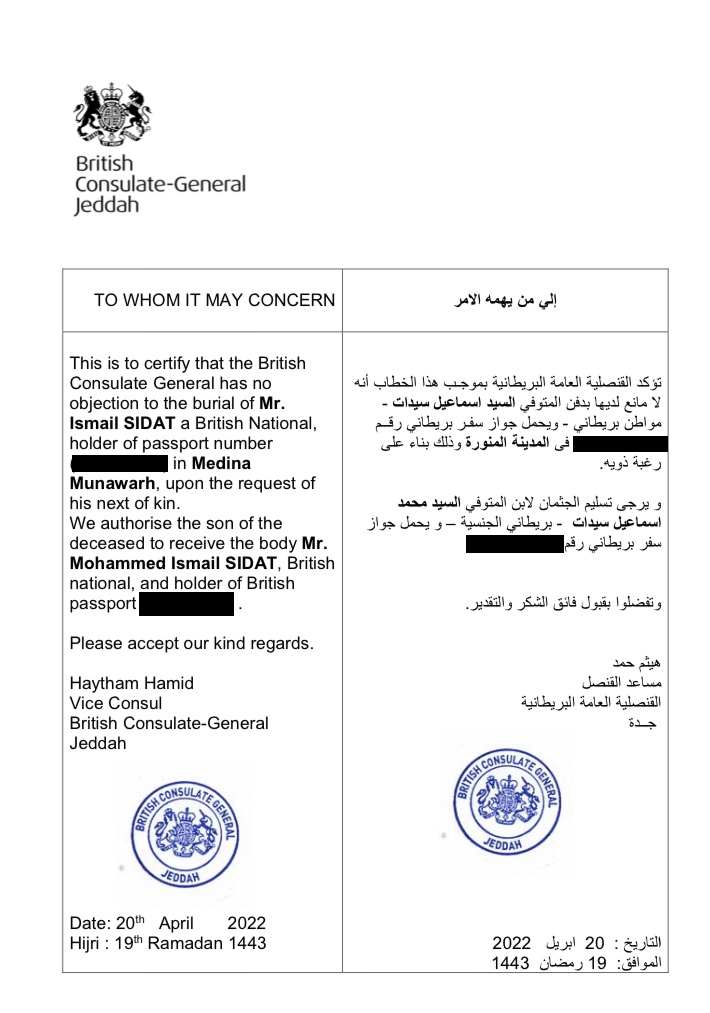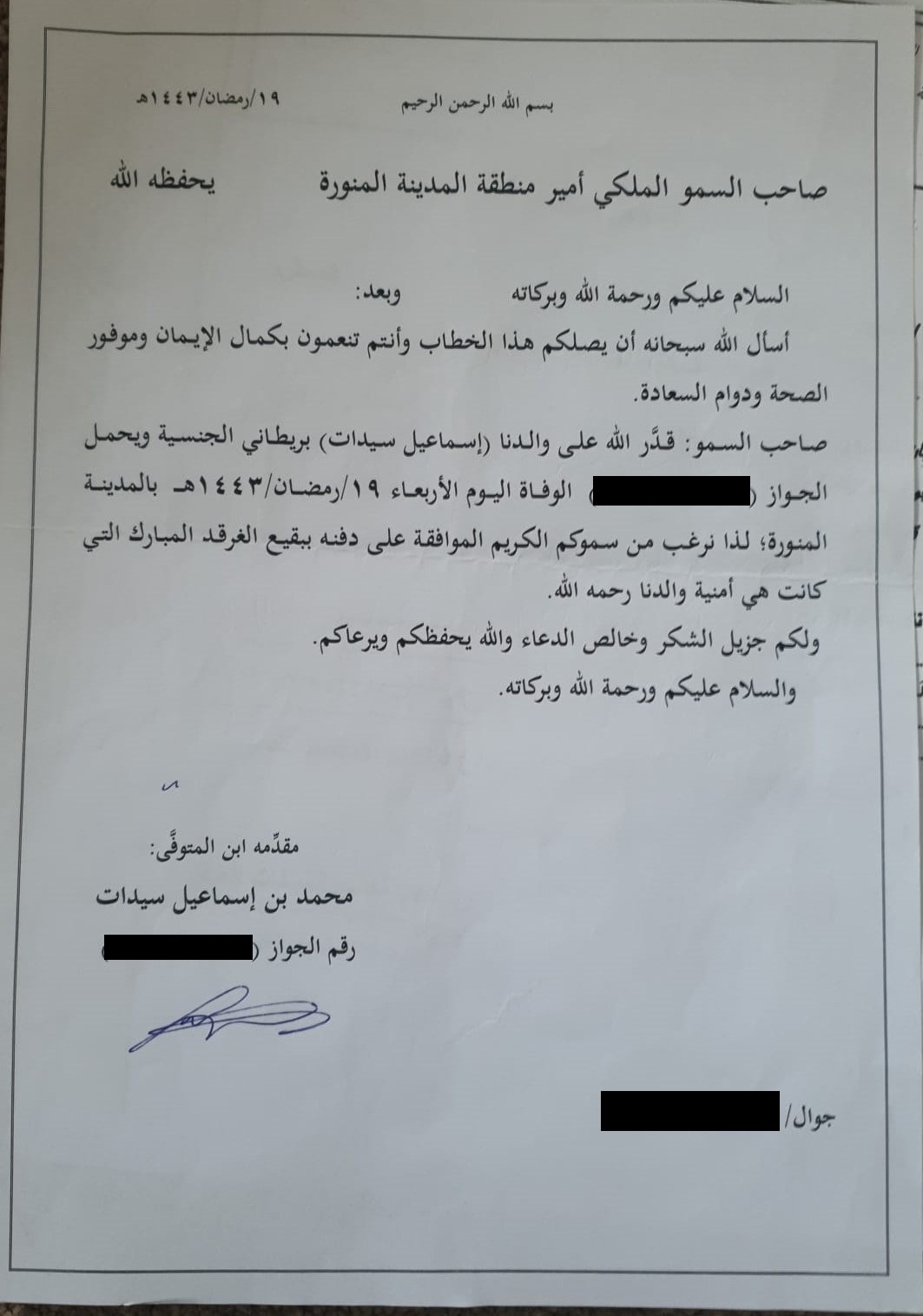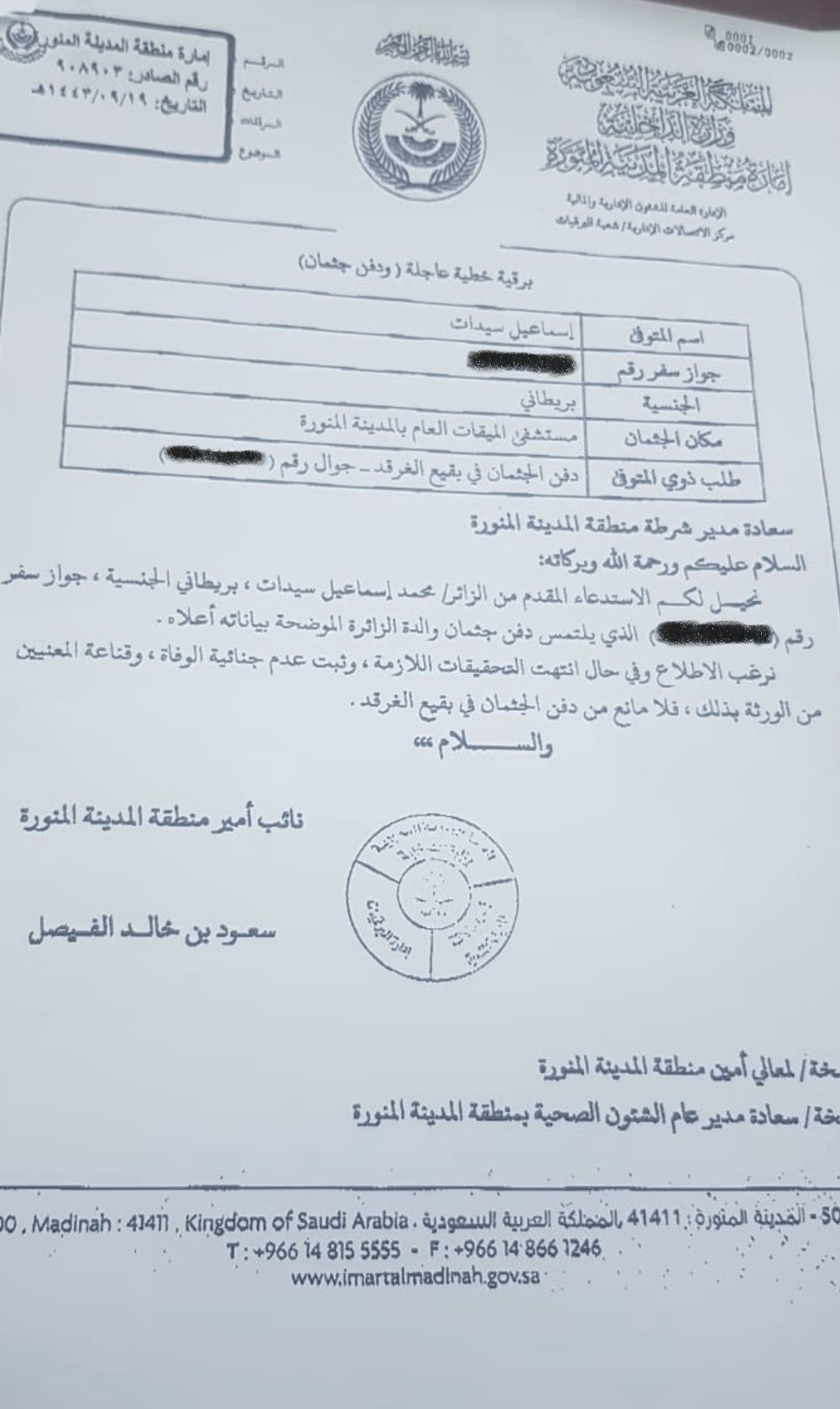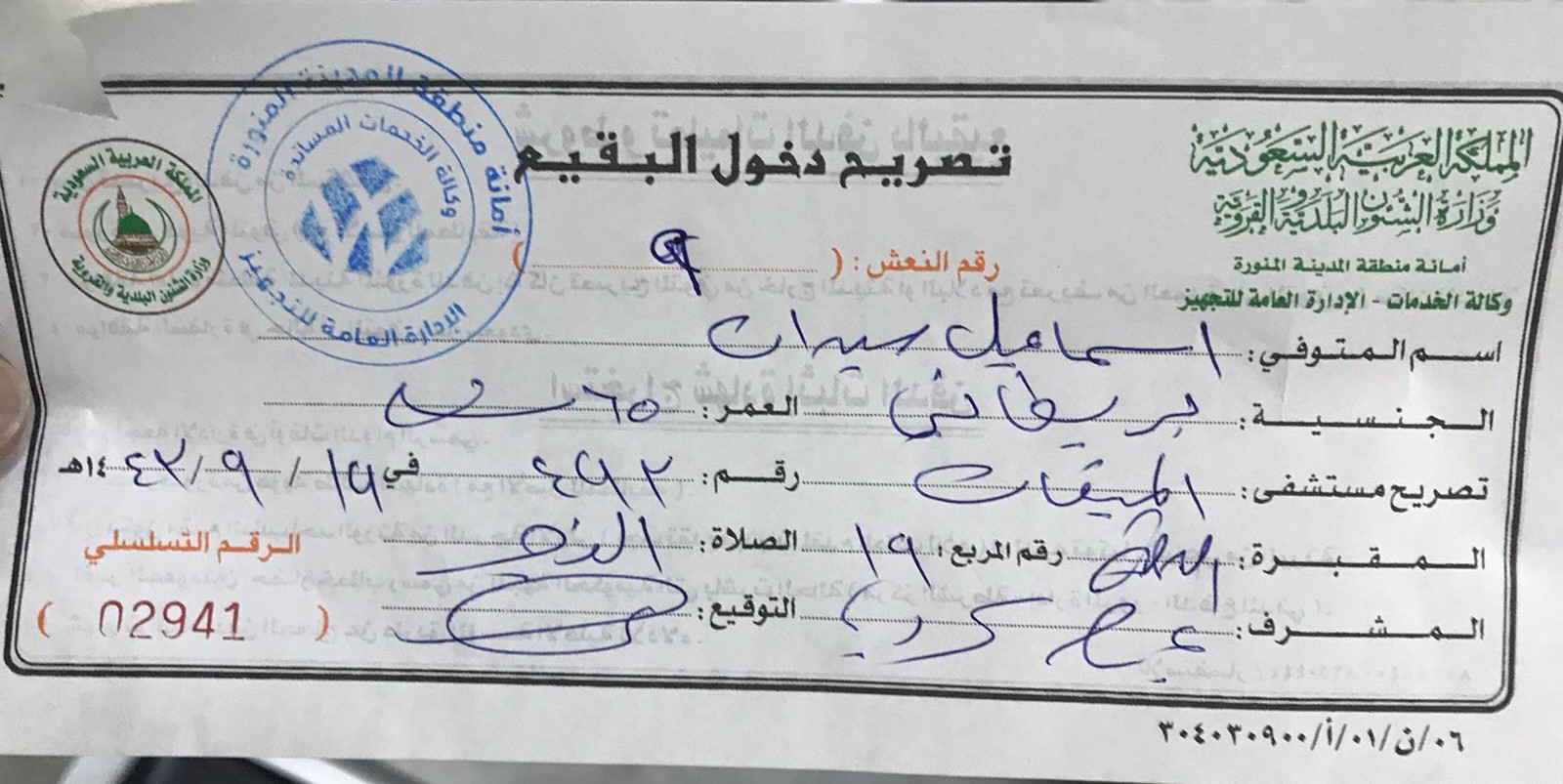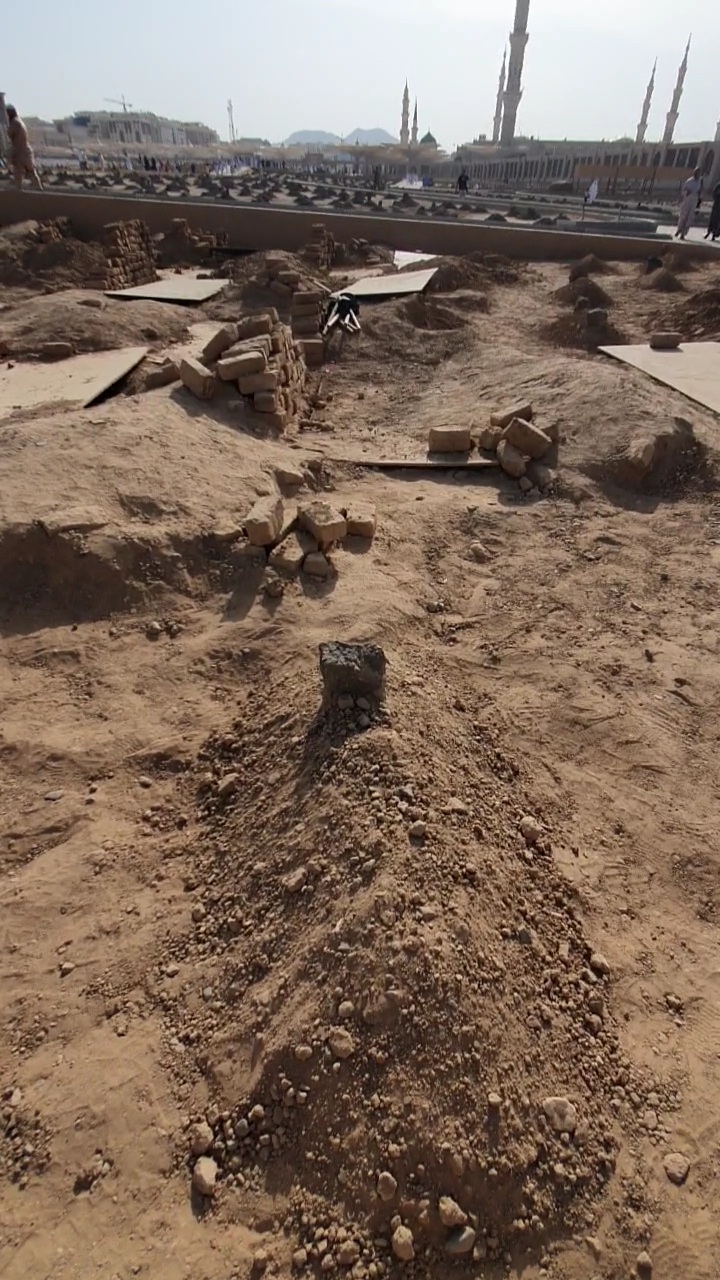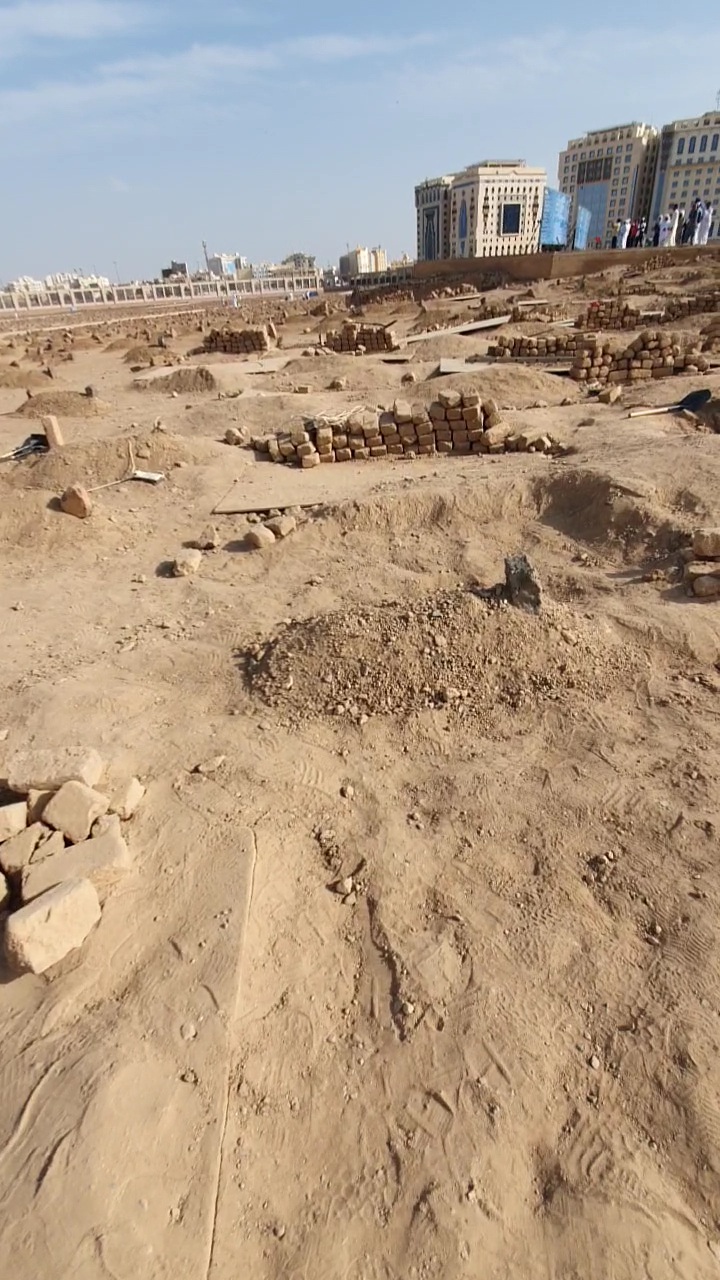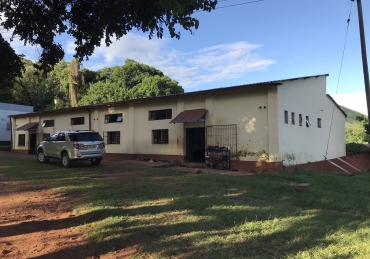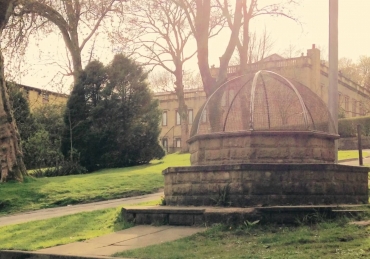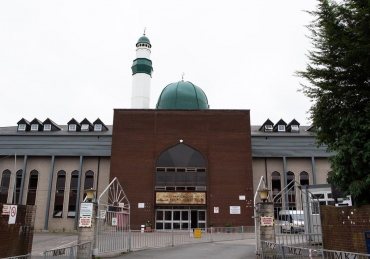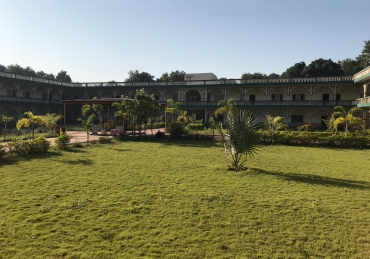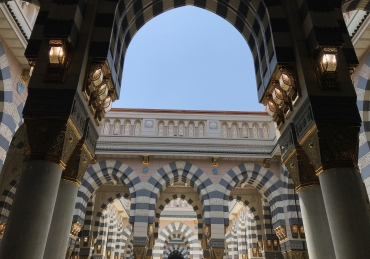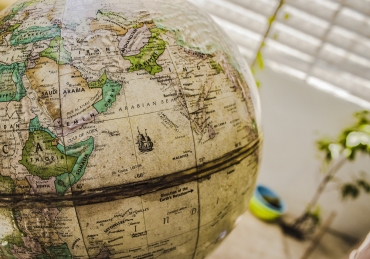Demise of Ḥāfiẓ Ismail Ahmed Sidat of Blackburn in Madīnah Munawwarah in Ramaḍān
In the Name of Allah, the Merciful, the Beneficent
Introduction
The second cousin of my respected father and a resident of 1 Harwood Gate, Blackburn, Ḥāfiẓ Ismail Ahmed Sidat had the honour of passing away in the blessed city of Madīnah a few days ago on Wednesday 19 Ramaḍān 1443 (20 April 2022) at approximately 9.10am. He was subsequently buried in the Baqīʿ graveyard the following morning after Fajr Ṣalāh. I was honoured to have assisted in the funeral arrangements and participated in the Janāzah Ṣalāh and burial, which prompted me to pen this brief obituary.
Passing away in the blessed city of Madīnah in the blessed month of Ramadan is an enviable death. The Prophet ﷺ said, as reported in a ṣaḥīḥ (sound) ḥadīth, “Whoever is able to die in Madīnah, he should die there, for I will intercede on behalf of anyone who dies there” (Sunan al-Tirmidhī, 3917). Sayyidunā ʿUmar ibn al-Khaṭṭāb (d. 23/644, may Allah be pleased with him) supplicated:
اللهم ارزقني شهادة في سبيلك واجعل موتي في بلد رسولك صلى الله عليه وسلم
O Allah, grant me martyrdom in Your path and let my death be in the city of Your Messenger ﷺ (Ṣaḥīḥ al-Bukhārī, 1890)
This supplication was accepted and he was martyred in the blessed city. This is a bounty from Allah Almighty which is bestowed upon whomever He wishes. Whilst one may make every effort to pass away in the blessed city, there is no guarantee.
Ḥāfiẓ Ismail was not a qualified scholar or a famous person. He was a ‘normal person’, yet special in the eyes of Allah. He had a close attachment with the Ḥaramayn and had an ardent desire to visit them since being diagnosed with cancer in November 2021. His wish was eventually realised; not only did he visit Ḥaramayn, Madīnah Munawwarah became his final resting place.
Early Life
Ḥāfiẓ Ismail Ahmed Sidat was born in 1956 in the Indian village of Harangam in the state of Gujarat. He lost his mother at a young age and was looked after by his elder siblings, particularly his oldest sister Fatima Patel who currently resides in Batley, she is the wife of late Qari Salim Patel, along with his sister-in-law Amina Sidat who still resides in Harangam. According to his family, losing his mother at a young age shaped and moulded his character, particularly his soft-hearted nature.
Upon the encouragement of some family members, and support from his father as well as his Paternal Uncle Mohammed Asmalji Sidat, Ḥāfiẓ Ismail enrolled in the famous Husayniyyah seminary in Rander where he completed his Ḥifẓ (memorisation) of the Quran and also studied several years of the ʿĀlim course. Interestingly, he would bring the late Shaykh al-Ḥadīth Mawlānā Islām al-Ḥaq (d. 1416/1996) from Rander to his village to deliver speeches. Mawlānā Islām al-Ḥaq was the first Shaykh al-Ḥadīth of Darul Uloom Bury who taught Ṣaḥīḥ al-Bukhārī for fifteen years. I featured him in an article of mine entitled ‘Forty pious people who passed away in Sajdah’ and wrote the following:
“He passed away in the blessed city of Madīnah on 27 Ramaḍān in the state of Sajdah at approximately 4.30am. He was extremely pious and humble, similar to his son our beloved Mufti Ikrām al-Ḥaq (b. 1374/1955). His clothes started to emit fragrance after his demise.”
He, like Ḥāfiẓ Ismail, was buried in the Baqīʿ graveyard.
Migration to the UK and early jobs
In 1977/78, upon leaving Rander, Ḥāfiẓ Ismail migrated to the UK for marriage. He married Fatima, the sister of my very dear friend, Shaykh Ahmad Sidat of Jaame Masjid, Blackburn, and the Daughter of Sufi Suleman Sidat who was one of the very first Indian Muslims in the area and founded what is now Jaame Masjid.
Between 1978 and 1991, Ḥāfiẓ Ismail worked in various jobs within the textiles and car parts industries. He also established a second-hand shop in the Mill Hill area of Blackburn and was the sole Asian in the area. Mill Hill is a difficult area to reside in today let alone then. He also attempted to do business in some other goods including beds.
During this period, he resided in the Audley Range area of Blackburn. I understand that he taught Maktab in the old Masjid in the Daisy area and led Tarāwiḥ Ṣalāh.
1991 to 2004
In 1991, the family moved to Darwen where Ḥāfiẓ Ismail ran a newsagent for the next 13 years. This is why many people know him as ‘Ismail Bhai Darwen’. During this period, my respected father would often visit his shop.
2004 to 2021
In 2004, the newsagent was sold and the family moved to 1 Harwood Gate, near Darul Uloom Blackburn. Ḥāfiẓ Ismail started to work for a plastic food bag manufacturing company in Haslingden. He continued working here until 2019, when he was employed by Blackburn College as a caretaker supervisor, a role he continued in until he was diagnosed for cancer in November 2021.
Earlier visits to Ḥaramayn
Following his return to Blackburn and not having to run the business throughout the year, Ḥāfiẓ Ismail and his wife visited Ḥaramayn multiple time including during the blessed month of Ramaḍān several times.
However, the plans to travel on the final two occasions were cancelled. The first was due to Ḥāfiẓ Ismail suffering from a detached retina the night before the flight and the second was cancelled due to the first Covid-19 lockdown in March 2020. This second trip was arranged by his son Muhammad for all his immediate family members including his only surviving brother at the time Yusuf Ahmed Sidat who was scheduled to travel from India and join them. His brother Yusuf suffered Covid-19 and passed away in Ramadan 1442/2021.
Wife’s Cancer Diagnosis
Prior to making plans for ʿUmrah in March 2020, Ḥāfiẓ Ismail had travelled to India with his wife to his home village of Harangam during December 2019 and January 2020. It was during this trip that his wife fell seriously ill and upon their return was diagnosed with Stage 3 Ovarian Cancer. She underwent major surgery and completed chemotherapy on two separate occasions after the cancer returned. Her initial rehabilitation took place at her son Muhammad’s home before returning back to the family home after a few weeks. It was during this time that Ḥāfiẓ Ismail had experienced a major role reversal at home and looked after his wife during her treatment. He would comment to my respected father that he had learned to make fresh chapattis and also some Indian dishes. Ḥāfiẓ Ismail found it very difficult to watch his wife suffering and struggled with the thought of being without her.
Cancer Diagnosis in November 2021
In November 2021, Ḥāfiẓ Ismail was diagnosed with Stage-4 lung cancer which had by then spread throughout his body. He was instructed to stop working immediately.
My respected father was very close to him and encouraged him to travel to Ḥaramayn. He would visit him regularly and would ask his son Muhammad about his father’s health almost on a daily basis when they would meet at Darul Uloom for Ṣalāh.
Ḥāfiẓ Ismail underwent several sessions of immunotherapy but his condition deteriorated to such an extent that he was more or less bed bound with very limited mobility due to muscle loss and the impact of tumours along his spine and bones.
He subsequently moved in with his son Muhammad on Moss Gate round the corner from the family home and was supported by his daughter-in-law Safeera as well as his three daughters. His mood was always lightened with the presence of his family around him particularly his grandchildren.
Visit to Makkah and Madīnah
In December 2021, Ḥāfiẓ Ismail asked his doctor if he could travel to Saudi Arabia. My parents were already in Saudi Arabia and were in regular communication with him. The doctors advised against travel due to the ongoing treatment.
In February, Ḥāfiẓ Ismail saw a dream in which a deceased friend of his was drinking water, and gave him the glass of water to drink from. Ḥāfiẓ Ismail commented to his family that it seems my time has come close.
The family were concerned about travelling, with their father’s health deteriorating, as well as their mother undergoing cancer treatment. In particular, Ḥāfiẓ Ismail’s daughter Hajra had seen a dream some time before their father was diagnosed with cancer. She saw that the family were travelling for ʿUmrah and there was an accident on the way which did not directly involve them. However, some debris from the accident hit Hajra on the neck and she was passing away. The family were concerned about this dream and whether they should continue with the journey. Ḥāfiẓ Ismail’s son Muhammad visited Mufti Ikram al-Haq Ṣāḥib, the Imam of Jaame Masjid and asked for his advice. Mufti Ṣāḥib said they should have no hesitation in travelling to Ḥaramayn and that they should donate some Ṣadaqah before departing. On the eve of their flight, Muhammed also asked me and I advised him to continue with the journey as planned and also consult with my father who was by then already in Saudi Arabia.
The family decided to proceed with the journey. Ḥāfiẓ Ismail was struggling to eat and had lost a lot of mobility and was using a special reclining wheelchair. They arrived in Madīnah Munawwarah on 23 March 2022. The group comprised of Ḥāfiẓ Ismail, his wife Fatima, his daughters Aishah, Hajra and Zohra, his eldest Grandson Muhammad, and his son Muhammad and his wife Safeera and their two sons Adam and Yusuf. They were joined later by his eldest brother’s grandson Ahmed and his wife. They resided in Madīnah Munawwarah until 29 March 2022 and thereafter travelled to Makkah al-Mukarramah and performed ʿUmrah. My parents and elder brother were in Makkah al-Mukarramah so they arranged food for them and supported them throughout their stay, until bidding them farewell on 2 Ramadan 1443, when they returned to Madīnah Munawwarah.
After returning to Madīnah Munawwarah, two of Ḥāfiẓ Ismail’s daughters and his son Muhammad’s family returned to the UK. Ḥāfiẓ Ismail, his wife, his son and daughter Hajrah remained in Madīnah Munawwarah.
At this stage, Ḥāfiẓ Ismail was fully conscious and there was no indication that his health would deteriorate significantly in the coming days. However, if anyone would talk about any worldly matter in his presence, he would advise them to stop.
Final days before his demise
A week before he passed away, Ḥāfiẓ Ismail fell severely ill and was admitted to Mustashfa Al Aam (The General Hospital) in Madīnah Munawwarah. He was put on a drip. However, he struggled to regain full consciousness. He remained in hospital between Wednesday 13 April and Friday 15 April 2022. He was discharged and remained in the Frontel Alharithia hotel until his demise. He was struggling to swallow at this stage, which made it difficult for him to take his pain medication.
Our arrival into Madīnah Munawwarah
I arrived into Makkah al-Mukarramah on Monday 18 April 2022 at 1.30am. Later in the day after Ẓuhr Ṣalah, we departed for Madīnah Munawwarah with my parents. In the evening, I accompanied my father to visit Ḥāfiz Ismail in his hotel room. His son Muhammad confirmed he had not spoken at all during the day. When my father asked him how he was, he said “Al-Ḥamdulillāh” and struggled to say anything else.
Later after midnight, my father visited him once again with our very dear family friend, Dr Imran Satia who had travelled from Canada.
Final rendering of Kalimah on Tuesday 18 Ramaḍān (19 April)
The following day, my parents visited him again and his condition had deteriorated severely. Dr Imran Satia also visited and advised that he appears to be in the final days of his life. Al-Ḥamdulillāh, my father did Talqīn and Ḥāfiz Ismail recited the Kalimah and raised his finger. These were the final words heard from him before his demise.
Shaykh Rihab also accompanied my father on one of the visits. He recalls that Ḥāfiẓ Ismail had a smile on his face. Shaykh Rihab is a dynamic learned young Arab scholar with an enviable grasp on poetry. He has authored many books and studies with my father whenever my father is in Ḥaramayn. Currently, they are reading Kanz al-ʿŪmmāl and Jāmiʿ al-Ṣagīr.
Demise on Wednesday 19 Ramaḍān (20 April)
On Wednesday morning, after Fajr Ṣalāh I went to sleep. My parents went to visit Ḥāfiẓ Ismail’s hotel and his health had deteriorated further. My father called Dr Imran Satia once again. He came and advised that there are only a few hours remaining.
Thus, at approximately 9.10am, his soul departed from this world. How fortunate and blessed to have passed away in Ramaḍān and in the blessed city. Interestingly, his father and brother also passed away in Ramaḍān.
It is also worth noting that a person who passes away with cancer is regarded a martyr in the hereafter. The ḥadīth (المبطون شهيد) transmitted in Ṣaḥīḥ al-Bukhārī (5733) refers to anyone who passes away from an inner (bāṭin) illness, according to Mawlānā Rashīd Aḥmad Gangohī (d. 1323/1905). Over ten years ago, Mawlānā Sulayman Varachia of Coventry also passed away in Madīnah Munawwarah after suffering from cancer. My respected father was very close to him and we would visit his residence regularly.
Funeral arrangements
After his demise, the funeral arrangements began. For the benefit of readers and to comply with the instruction of my mother who wishes to pass away in the blessed city, the process is outlined in detail. It includes the following:
- Doctor coming to the hotel to check the pulse and to confirm death.
- Police visiting the hotel and checking the passport and visa along with any other potential suspicious activity.
These two things were duly completed.
- Transporting the body to the hospital, in this case Mustashfa al-Miqat (Miqat Hospital).
- Obtaining death certificate from Mustashfa al-Miqat.
- Sending the death certificate to the British Consulate in Jeddah and obtaining a no-objection letter for local burial.
- Obtaining police clearance for burial.
- Obtaining permission for burial in the Baqīʿ graveyard.
- Ghusl, Ṣalāh and burial.
Transporting the body to Mustashfa al-Miqat (Miqat Hospital)
I was asleep when Ḥāfiẓ Ismail passed away. I woke up at 11.30am and saw the message on my phone. I got ready and before heading to Masjid Nabawī for Ẓuhr Ṣalāh, I visited the Money Exchanger (Ṣarrāf) next to the Dar Al-Naeem hotel on the final line of hotels behind Masjid Nabawī, as I had some money to distribute to the poor residents of Madīnah Munawwarah. The day before, we had done an initial distribution with Mawlānā Zubair Ṣāḥib and Mawlānā advised I use this money exchange as they give a better rate. It is difficult to get 50 Riyal notes in bulk. However, this money exchange kindly agreed.
When I arrived at the Money Exchanger just before 12 noon and started the exchange (and it is a lengthy process if the amount is big), Mawlānā Zubair Ṣāḥib arrived in his car. I was surprised to see him. He had some money to exchange. He mentioned to me that my father had phoned him about Ḥāfiẓ Ismail’s demise. We were planning to go for distribution after Ẓuhr Ṣalāh, however, the priority was now to arrange the funeral. I asked him where he planned to perform Ẓuhr Ṣalāh. He replied that in Masjid Nabawī. So, I sat in his car and we headed towards the entrance of the underground car park from the Baqīʿ side. On route, my respected father phoned Mawlānā informing him that the ambulance has arrived and that they will be transporting the body to Mustashfa al-Miqat. Mawlānā Zubair informed him that we will perform Ẓuhr Ṣalāh in Masjid Nabawī and come immediately to the hospital.
As we arrived at the car park entrance, we were told the car park is full. Mawlānā Zubair then drove the car around the ring road and entered the car park from another entry point. We entered, but we could not find a space. By now, I was worried that we will miss Ẓuhr Ṣalāh. As we were exiting the car park, my father phoned and informed us that the ambulance had left and they could not go in the ambulance. Mawlānā Zubair informed my father that we will pick them up in one minute as we are close by. Subḥanallah! I had no plan to meet Mawlānā Zubair at the money exchange, and not finding a car park space was also for a very good reason.
We collected my father, Ḥāfiẓ Ismail’s son Muhammad, and Ḥāfiẓ Ismail’s wife’s nephew, my very dear friend Mawlānā Muḥammad ibn Shaykh Ahmed Sidat. Together, we went to Mustashfa al-Miqat and arrived there at 1pm. This hospital is near the Masjid in Dhū al-Ḥulayfah. This is one of several hospitals in the city that handle dead bodies. In the meanwhile, Ḥāfiẓ Sulayman ibn Shaykh Ahmed Sidat stayed at the hotel with other family members.
We performed Ẓuhr Ṣalāh at the neighbouring Masjid and thereafter waited for the doctor. Eventually, the doctor arrived and issued the death certificate.
Having a local like Mawlānā Zubair Ṣāḥib made the process much easier. Mawlānā Zubair Ṣāḥib spent several hours with us, Allah Almighty reward him for all his efforts.
No-objection letter from the Consulate
Ḥāfiẓ Ismail’s son Mohammad had already notified the British Consulate in Jeddah via email. Upon receiving the death certificate, the Consulate emailed a No Objection Letter confirming that they have no objection to his burial in Madinah Munawwarah. This is a letter is a pre-requisite before any burial can take place. The next of kin’s passport and visa copy was also emailed to the Consulate.
Return to the hotel
At 2.30pm, we arrived back to the Frontel Alharithia hotel to print the No Objection letter. One of the hotel managers, brother Abu Ḥusayn of African descent was very helpful. He kindly offered to take us in his car to the Markaziyyah Police Station (Central Police Station).
Central Police Station
After arriving at the Markaziyyah Police Station, it took very long, at least an hour. They requested the Tawakkalna App number which we did not have. At the Airport, they normally write this number on the passport. However, they did not do so on Ḥāfiẓ Ismail’s passport. We therefore had no choice but to return to the hotel.
On our return journey, Mawlānā Zubair asked Abu Ḥusayn if he was aware of more Rubāṭs housing poor people for our distribution. Abu Ḥusayn drove past some Rubāṭs on the way back and pointed them out.
We returned to the hotel, performed ʿAṣr Ṣalāh and collected Ḥāfiẓ Ismail’s mobile phone which had the Tawakkalna App, and returned to the police station. At the Police Station, it was another hour’s wait. Eventually, the police clearance was issued.
Baqīʿ burial permission
There was an hour left before Maghrib Ṣalāh. Burial in Baqīʿ was looking difficult on the day. This is because once the police clearance is issued, the body can be bathed and buried. However, the biggest hurdle was that non-Saudi visitors are now not buried in the Baqīʿ graveyard. Although their Ṣalāh takes place in Masjid Nabawī, they are buried in a graveyard near mount Uḥud. Burial in Baqīʿ requires special permission from the Emir of Madīnah.
Ḥāfiẓ Ismail’s brother-in-law, my dear friend Shaykh Ahmad Sidat has extensive contacts in Saudi Arabia. He contacted his contact in Madīnah, Shaykh Sulayman Namlah who kindly agreed to assist.
From the Police Station, we returned to Masjid Nabawī. My respected father, Mawlānā Muhammad and Ḥāfiẓ Ismail’s Muhammad all dropped off. As there was an hour left for Maghrib Ṣalāh, Mawlānā Zubair and I decided to do some distribution in some of the Rubāṭs.
Immediately after ʿIshāʾ Ṣalāh, my father, Ḥāfiz Ismail’s son Muhammad and Shaykh Ahmed Sidat’s sons Mawlānā Muhammad and Ḥāfiẓ Sulayman went to the Madinah’s Emir’s office. Shaykh Sulayman Namlah was also present. Here, they were formally required to submit a request in writing seeking permission from the Emir for burial in the Baqīʿ graveyard.
This request was eventually accepted and the Baqīʿ graveyard authorities were notified. Allah Almighty reward Shaykh Sulayman Namlah for his efforts, as it was looking difficult.
Collecting the body
After Tarāwīḥ Ṣalāh, my mother had arranged for food for Ḥāfiẓ Ismail’s family. This was kindly prepared by my dear friend Mawlānā Abdurraheem Meer’s wife who is from Bradford and spends a lot of time in Madīnah Munawwarah. May Allah reward Mawlānā and his wife for their support.
After food in their room at Frontel Alharithia hotel, we requested my father to rest as he had not slept since the morning. He was very close to Ḥāfiẓ Ismail and fond of him. He would knock on his house, 1 Harwood Gate, when he would walk from our home to Darul Uloom Blackburn and regularly visit him.
Mawlānā Muhammad, Ḥāfiz Ismail’s Muhammad and I took a taxi at 12am and we proceeded to Mustashfa al-Miqat to collect the body. The officer asked us for the acceptance letter from the Emir’s office. We did not have this as the Emir’s office had notified the Baqīʿ graveyard authorities. The officer phoned the Baqīʿ authorities and confirmed this. We were asked to verify and sign that the body being transported is Ḥāfiẓ Ismail.
The ambulance then transported Ḥāfiẓ Ismail to the Ghusl facility, neighbouring the Baqīʿ graveyard. We followed behind in a taxi. We arrived at 1.30am and by 2pm the Ghusl was completed. Ḥāfiẓ Sulayman ibn Shaykh Ahmad also arrived to join the Ghusl.
Distribution of Funds
At 2am, I decided to continue with the distribution of funds. Mawlānā Zubair Ṣāḥib collected me from the Ghusl facility and we visited the Rubats pointed out earlier by Abu Ḥusayn. This is the first time Mawlānā Zubair Ṣāḥib visited these buildings. Subḥanallāh! This was also a blessing of Ḥāfiz Ismail.
To Masjid Nabawī
At 3am, I returned to the Ghusl facility. My respected father phoned me a short while later, I updated him and he arrived at 3.30pm. I also briefed my dear friend Shaykh Fazlurrehman, chaplain of Royal Blackburn Hospital and he arrived minutes later.
At 3.45am, the body was placed on a buggy and we were given a special permit to enter the Baqīʿ graveyard.
We all sat on the buggy and the driver proceeded to door number 42 at the front of Masjid Nabawī, from where the Imams enter. The body was placed outside the Masjid. As we entered the Masjid, the officer responsible asked me for the Baqīʿ entry slip and the nationality of Ḥāfiẓ Ismail. He expressed his surprise and commented on his good fortune.
In Masjid Nabawī, there is an allocated space next to Riyad al-Jannah for the family of the deceased. We performed Tahajjud Ṣalāh here and waited for the Adhān of Fajr Ṣalāh. Shaykh Fazlurrehman’s son, Ḥāfiẓ Zakwān also arrived.
My brother’s arrival and Fajr Ṣalāh
My elder brother, Mufti Mohammed arrived at 3.15am at Madinah Airport. I was in communication with him. He left from the Airport after 4am and arrived at the Dar al-Hijrah hotel to the rear of Masjid Nabawī at approximately 4.30am. It was very tight for him to reach the Masjid, as the doors were closed and he had to come from around the Masjid. The Fajr Adhān was rendered at 4.33am. Al-Ḥamdulillāh, he managed to reach at 4.45pm, performed two Rakʿat Sunnats of Fajr and immediately thereafter Fajr Ṣalāh commenced. This was nothing short of a miracle. My elder brother was much closer to Ḥāfiẓ Ismail than myself. They along with my father would arrange Qurbani and also meet each other more frequently. I recall my father commenting a day before that despite trying our utmost best for the Janāzah Ṣalāh yesterday, it seems as though the Janāzah Ṣalāh will happen tomorrow as Muhammad is not present.
Fajr Ṣalāh commenced, and for me, this was the first time ever that I was performing Ṣalāh in Masjid Nabawī in congregation in the first Ṣaff (row). This again was a blessing of Ḥāfiẓ Ismail. The Imam recited Sūrah al-Nabā the final verse of which is:
إنا أنذرناكم عذابا قريبا، يوم ينظر المرء ما قدمت يداه ويقول الكافر يا ليتني كنت ترابا
Indeed, We have warned you of a near punishment on the Day when a man will observe what his hands have put forth and the disbeliever will say, “Oh, I wish that I were dust!”
Burial in Baqīʿ graveyard
Fajr Ṣalāh finished at 5am and Janāzah Ṣalāh was performed immediately thereafter. There were five Janāzahs in total; four adults and one baby. After the Janāzah Ṣalāh, we took the body to the Baqīʿ graveyard. Several people from the UK including my cousins, Mawlānā Yahya and Mawlānā Rashid ibn Mawlānā Hashim Ṣāḥib also joined on route to Baqīʿ. Many others joined.
The process was swift. By 5.30am, the whole burial process was finished. My respected father and Ḥāfiẓ Ismail’s Muhammad entered the grave, which is near the grave of the companion ʿUthmān ibn ʿAffān (d. 35/656, may Allah be pleased with him).
After the burial, my respected father rendered the recitation at the head side and feet side and made a short supplication. Shaykh Sulayman Namlah also visited the grave. The burial in Madīnah is free, although it is good to give some money to the Ghusl and burial staff as we did.
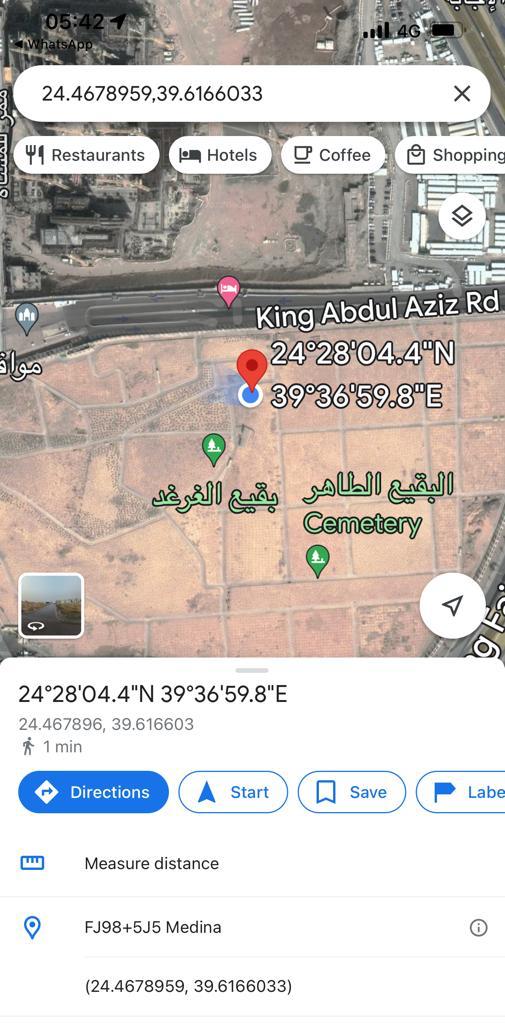

After the burial, we visited the grave of ʿUthmān (may Allah be pleased with him). Many companions of the Prophet ﷺ are buried here. It is suggested that approximately ten thousand companions are buried here (Manāsik Mullā ʿAlī al-Qārī, p. 730; Ḥāshiyah al-Ṭaḥṭāwī ʿalā Marāqī al-Falāḥ, p. 750). This has also been narrated from Imam Mālik ibn Anas (d. 179/795) (Wafāʾ al-Wafāʾ, 3: 100; al-Mawāhib al-Ladunniyyah, 12: 262). The Prophet ﷺ would regularly visit Baqīʿ at night and supplicate:
“O Allah, forgive the inhabitants of Baqīʿ al-Garqad” (Ṣaḥīḥ Muslim, 974).
This is why Muslims yearn to be buried here. Saudi authorities are kindly requested to review this policy of burying visitors in another graveyard.
Was my journey destined for the Janāzah?
I regard it as my good fortune to have assisted in the burial arrangements and participated in the Janāzah Ṣalāh and burial. On reflection, this was only through the mercy of Allah Almighty and His plan. Sometime a person plans with a specific purpose in mind only to realise later that Allah Almighty has other plans.
When I returned from West Africa at the beginning of March 2022, my father suggested I book a single ticket to Saudi Arabia on 17 April with my sister Nawaar. I was initially hesitant because my travel plans for the next two months were not confirmed. Nevertheless, I went ahead and booked the ticket from Manchester to Jeddah via Amsterdam. A few days later, I travelled to Malawi unexpectedly. At the time, I thought I should visit Saudi Arabia on my return from Malawi and cancel the 17 April ticket. However, I decided to return to the UK and continue with the 17 April journey.
Another point of reflection. I arrived into Makkah al-Mukarramah on Monday 18 April at 1.30am, performed ʿUmrah, ate Suḥūr, performed Fajr Ṣalāh, rested thereafter and departed for Madīnah Munawwarah after Ẓuhr Ṣalāh. A thought continued to linger in my mind that I should reside in Makkah al-Mukarramah for longer, and thereafter travel by train to Madīnah Munawwarah on Wednesday or even Thursday. However, I decided to travel with my parents on Monday.
Ḥāfiẓ Ismail’s family decided to return to the UK on Friday morning via Qatar Airlines. I also returned to the UK on the same day and this was booked in advance. All of this cannot just be mere coincidence and it appears as though my journey to Ḥaramayn was decreed for the Janāzah and also for the distribution of funds; al-Ḥamdulillāh we distributed 76,640 Riyals to hundreds of families in different parts of Madīnah Munawwarah.
Qualities of Ḥāfiẓ Ismail
Upon my return to the UK, I asked Ḥāfiz Ismail’s son Muhammad to share some of the qualities of his father for wider benefit. He mentioned the following:
- Helping others: This is a quality that shines out from Ḥāfiẓ Ismail’s life. Extended family members would come to live in his family home for months at a time when they required support. He would keep his relatives in his home for prolonged periods. This includes his two sons-in-law. This quality was not confined to family members and relatives. He would go out of his way to help others. His friends and their families would seek support from him in a range of matters. My respected father Mufti Shabbir Ahmad has many such memories. Every year, Ḥāfiẓ Ismail would go out of his way to arrange Qurbani for our family and did not see it as a burden. He would travel with his son, my father and my elder brother. It is therefore no surprise, as his son Muhammad said, that everyone speaks good of him. No one has anything negative to say about him.
- Jovial and tolerant: Ḥāfiẓ Ismail was very jovial and tolerant. Family members would enjoy his company. Shaykh Ahmad Sidat’s sons Mawlānā Muhammad and Ḥāfiẓ Sulayman shared some fond memories. Both were very close to him.
- Attachment with the Quran: Towards the end of his life, Ḥāfiẓ Ismail would complete the recitation of the Quran in two days. Every Ramaḍān, he would recite the Quran loud and his neighbours would hear his recital.
- Halal earning: Throughout his life, Ḥāfiẓ Ismail worked hard and strived to earn a Halal earning. He was particular about giving his Zakat on time every year, as well as identifying worthy causes.
- Story telling: Ḥāfiẓ Ismail would love to tell stories. often embellished. His son Muhammad commented that his father’s demise has now become a great story in itself.
Shaykh Fazlurrehman Hassan’s Reflections
My dear friend, Shaykh Fazlurrehman Hassan serves as Chaplain at Royal Blackburn Hospital. He wrote the following after the burial:
“Alhamdulillah, it was an honour to have been given the opportunity to participate in the funeral and Janazah Salah of Hafiz Ismail Sidat of Blackburn at Masjid Nabawi after Fajr today in Madinatul Munawarrah. The Janazah Salah took place next to the blessed resting place and chambers of our Prophet Mohammed (peace be upon him), right opposite the Rawdha. What a beautiful death!
Thanks to Mufti Yusuf ibn Shabbir along with Moulana Mohammed Sidat for dealing with arrangements and for inviting me to attend.
I got to know late Hafiz Ismail Sidat from my visits as the hospital Imam during his stay at the Royal Blackburn Hospital. He never once complained about his illness.
Subhanallah, so fortunate to have taken his last breath in the illuminated city of the Prophet and then to be buried in Jannatul Baqi very close to the resting place of the 3rd Caliph of Islam; Sayyiduna Uthman ibn Affan (may Allah be pleased with him). The final prayer and dua at the grave in Jannatul Baqi was rendered by Mufti Shabbir Ahmed of Blackburn.
May we all be blessed to meet our Lord in this holy city of Madina and be ultimately guaranteed salvation. Abdullah ibn Umar (may Allah be pleased with them) narrated a Hadith that the messenger Mohammad (peace be upon him) said; “Whosoever is able to die in Madinah, then let him die there, for indeed, I will intercede for the one who dies there” (Musnad Ahmad, Sunan al-Tirmidhi).”
Reflections of daughters
The following are some reflections of Ḥāfiẓ Ismail’s daughters Aishah, Hajra and Zohra:
“My dad was not perfect, he did not appear to be pious, wasn’t a scholar, yet was just a normal man. Some of his qualities were as follows:
My father taught us the merciful side of Islam, and the easy side of it. He taught us to make dua from the heart, to ask Allah Almighty for things above and beyond our imagination, he told us to not put any ‘limit’ on our duas. He reassured us that it’s ok to ask for dunya as well as the akhirah. He often quoted Rabbana Atina fid dunya hasanah, to show that there is nothing wrong in asking for the dunya as well as the akhirah.
He showered us with affection, sitting with us, holding our hands and chatting about anything and everything. He cried for us often.
He could not sit back and watch injustice, or people being oppressed. He would always stand up to it, be vocal about it, he cared deeply and often had tears for strangers too.
He had a special way with people from all walks of life, from the young to the old, regardless of race, colour, religion or status. He made them all feel special and valued.
He had an exceptional relationship with his employees in India who worked in his land and house, he treated them like family, as equals and friends. He had tears for them too when they got ill or were in need.
Before we left for Umrah, he asked everyone’s forgiveness, apologised to those he thought needed an apology and even got in touch with long lost friends.
During his five months illness, he made sure to correct his Quran hifz. At one point he was reciting 15-20 Juz a day, he was confident towards the end that his Quran memorisation was now strong.
His grandchildren are known to say often: ‘granddad is more of a friend than a grandad.’
He often donated to families in need in India when approached, even his immediate family were not aware of the extent of this and how many families he supported in this way.
He often said: In 1988, when he went for Hajj with my mum leaving four children behind, he made dua at the first gaze upon the Kabah that he will Insha Allah return to this very spot with all his four children. This dua was accepted during his final visit, as his four adult children and grandchildren were with him.
My dad had a very good relationship with his nieces and nephews, treated them as his own children, cried for them as his own children and supported them as his own children. We often had them staying for extended periods of time at our home due to circumstances they were going through.
To sum it up, my father had a very soft heart and cared deeply for everyone.”
Reflections of Mawlānā Muhammad ibn Shaykh Ahmed Sidat
The following are some reflections of Mawlānā Muhammad ibn Shaykh Ahmed Sidat who rushed from Makkah al-Mukarramah to Madīnah Munawwarah on the day of the demise:
“Originally, they were planning to travel at the beginning of March. He had clearance to travel and one or two days before travelling, the scan showed he had a blood clot, so doctors said he cannot travel for two weeks. So, they travelled on 23rd March. A day before, he asked my brothers Suleman and Asad: Am I looking good to travel? Will they let me travel? He also said: Insha Allah I will wear good clothes tomorrow. When he was leaving, he told me: Tell your foi (aunty) to give me my teeth so I don’t look ill.
On Tuesday 18 Ramadan after Fajr Salah my brother Suleman got a phone call from Muhammad that come to our hotel. We went and started reciting Surah Yaseen. As soon as we started reciting, he held my hand tight and he was telling me something but I could not understand what he said. I asked a few times what are you saying but I could not understand. After he recited Surah Yaseen three times, I heard Hafiz Ismail read the Kalimah twice and saw him raise his the Shahadah finger of the right hand. That is the last I met him, then I left for Umrah. The following morning, I got a phone call from my brother Suleman to come straight to Madinah Sharif, so I left for Madinah Sharif, I got there approximately one hour after he passed away.”
Son Muhammad’s reflections
The following are some of the reflections of Ḥāfiẓ Ismail’s son Muhammad:
“Al-Hamdulillah, I think this article and my sisters’ reflections cover my father’s life and some of his best qualities quite well.
I feel blessed to have been given the opportunity to spend a lot of time with my father over the last few months which has opened my eyes to his true nature, a nature that was perfectly highlighted by the most perfect of endings.
Upon our return from Madinah Munawarrah, I have had countless people come up to me in our wonderful Moss Gate and Harwood Gate locality and ask about my father and enquire as to what was that quality that Allah Almighty loved about him that gave him the best of endings. In all honesty, he had so many, some of which have been highlighted by Mufti Yusuf. What I would like to add is that my father’s story perfectly highlights that there is no fixed template that can be followed to gain Allah’s pleasure. You don’t need to have a long beard and wear a thobe all day and have a tasbeeh in your hand and pray countless nafl salats to gain Allah’s pleasure. The compulsory acts are compulsory, but the optional acts of worship are many and varied and each individual must find their own balance of these acts to gain the ultimate reward and the ultimate ending like my father. This can be as simple as being a good neighbour and a trusted employee and friend which he was, these acts are not necessarily specific to being a Muslim but just being a good human. These qualities transcend religion.
Unfortunately, sometimes in our community we are so fixated on judging the book by its cover that we don’t spend the time on the content within until it is too late. I for one have taken this as a major lesson for myself.
As a family, we appreciated how difficult this journey was going to be and we tried to follow some advices from Mufti Ikram Sahib in reciting Ayat Kareema (لا إله إلا أنت سبحانك إني كنت من الظالمين) at least 40 times a day individually. Mufti Ikram visited us on several occasions and my father had also started this practice and could be heard praying this during his last days.
We also acted upon the advice of Brother Khalid Patel of thefcpm.com, an initiative set up under the guidance of the late Hadrat Mawlana Yusuf Motala Sahib. Uncle Khalid is married to my wife’s maternal aunt and upon visiting us prior to our departure he advised the recital of Durood Tunjeena 40 times each evening as the final action and to pray durood continuously at the time of any difficulty. This was prescribed to him by Hadrat Shaykh Mawlana Adam Sahib of Leicester.
I experienced the benefits of this at various points of our journey and also asked my family members to start praying durood whenever we anticipated some obstacles in our journey to try and fulfil my father’s wishes. My son Adam, 10 even began practicing this when we approached the lifts of our hotel which was congested most of the time. Al-hamdulillah, we experienced that this definitely opened doors for us and made our journey easy and manageable. Sometimes it may not have made things easier directly, but I found that it enabled us to have patience.
Finally, there are so many people who assisted us during this trip whilst we were in the Ḥaramayn. We would like to extend our utmost gratitude to the following, and please forgive us if we have missed anyone out:
- Mohammed Al-Ashqar Palliative Nurse Coordinatory at King Abdullah Medical City in Makkah. Brother Mohammed called us several times during our stay and also visited us in Makkah to check up on my father in our hotel, all outside of his usual work commitments.
- Dr Imran Satia – Professor at McMaster University Canada (Respiratory Specialist) – He visited us in Madinah and provided advice during the last hours of my father’s life.
- Dr Tanweer Ahmed GP – Shifa Surgery Blackburn – He visited us in Madinah and provided advice and made contact with our GP at Little Harwood Health Centre.
- Dr Ashraf Jogi – My cousin who is based in Yorkshire, and Dr Faatima Bala, my sister’s sister-in-law, both were always a call/WhatsApp message away for advice and reassurance.
- My paternal cousin Nazir Patel and his son Khalid from Blackburn, my paternal cousin Haroon Nazir Patel and his family from Leicester, my maternal cousins Mohammed Ahmed Sidat and Suleman Ahmed Sidat who assisted us greatly and visited us regularly in our hotels and provided emotional support just by their mere presence.
- Shaykh Sulayman Namla along with his associate Shaykh Ali and Shaykh Abdullah who assisted us during the burial process and during our initial stay in Madinah. Shaykh Sulayman regularly invited us for iftar at his spot in the Haram in Madinah.
There are countless others to mention including my wife Safeera and my sister’s husbands who took care of our children at home to fully enable us siblings to cater for our parents’ needs during this time. My paternal cousins Adam Ebrahim Sidat and Mohammed Ali Ebrahim Sidat both of whom treated my father and mother as their own.
A special mention to our wonderful neighbourhood at Moss Gate and Harwood Gate particularly our close neighbours who have assisted us in countless ways and provided emotional support during this time. We feel blessed to reside in an area close to Darul Uloom with so much neighbourly love. I truly believe that the blessings that emanate from the Darul Uloom and its pious students and teachers truly extend out into our neighbourhood.
Mufti Shabbir Sahib would catch me at every opportunity after Salah in Darul Uloom, sometimes on multiple occasions in a day and would ask me daily regarding my parents’ health. I really cannot thank Mufti Shabbir and Apa enough, and their two sons Mufti Mohammed and Mufti Yusuf. Mufti Sahib is a very busy individual and one of the most senior and respected scholars in the UK. Yet a day never went by that I would either see him in person or he would send me a loving voice note asking about us all and extended duas for us all. Mufti Sahab and Apa would attend to our needs before we even knew what our needs were, on countless occasions they would arrange for food to be sent to us. They almost became like a second set of parents for us during this time and I hope that we can try and meet their obligations when they return back.
I have one final request from readers. My youngest son Yusuf who is six has epilepsy and his condition has worsened considerably during the journey. Readers are requested to remember him and us all in their Duas.”
May Allah Almighty grant Ḥāfiẓ Ismail a resting place in Jannat al-Firdaws and grant us all a resting place in the Baqīʿ graveyard.
Dr Yusuf Shabbir
23 Ramadan 1443 / 24 April 2022
Note: Refer to the following link for the updated burial process in Madinah Munawwarah: https://oceanofislam.uk/other/burial-process-in-al-madinah-al-munawwarah/

